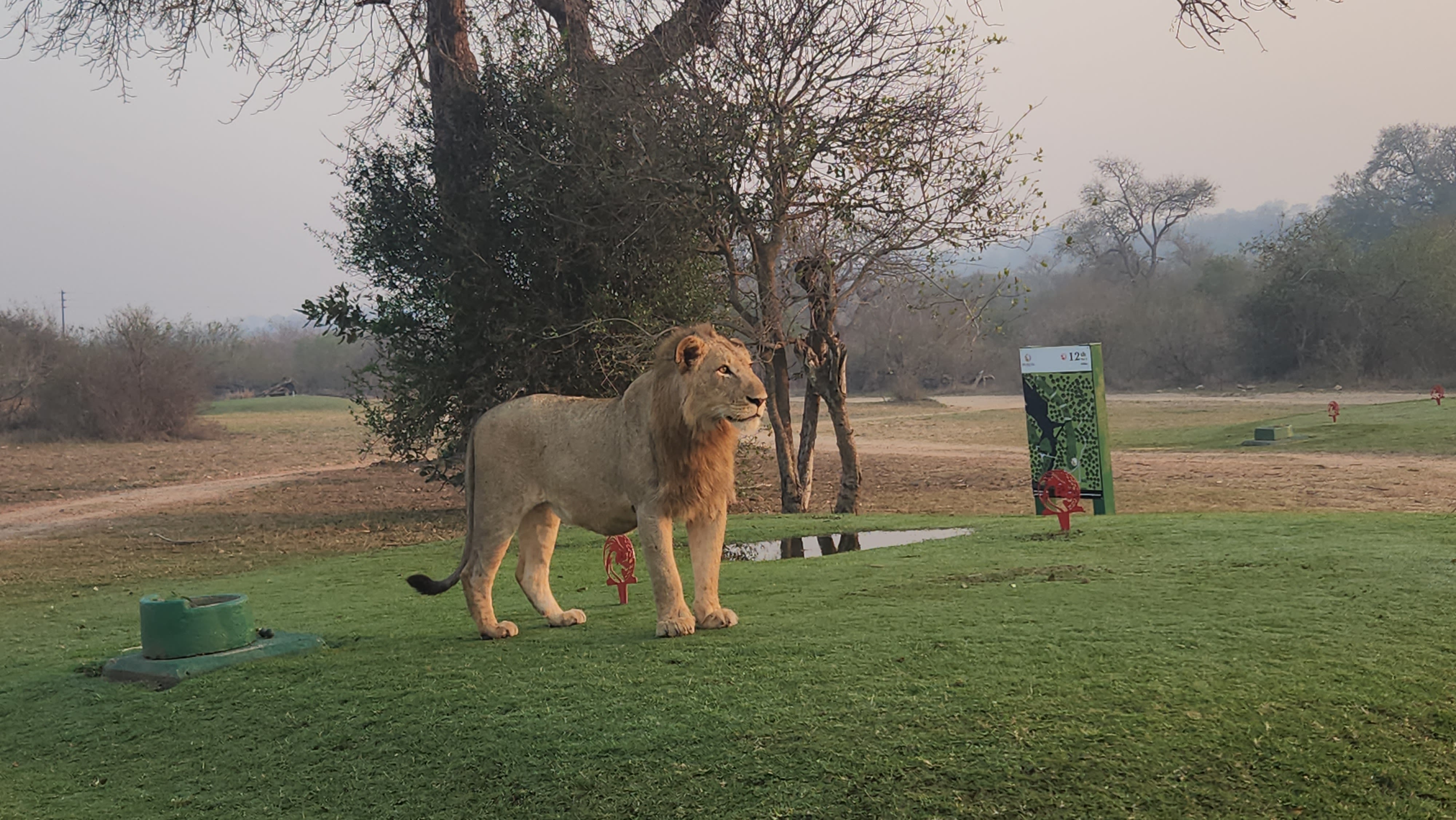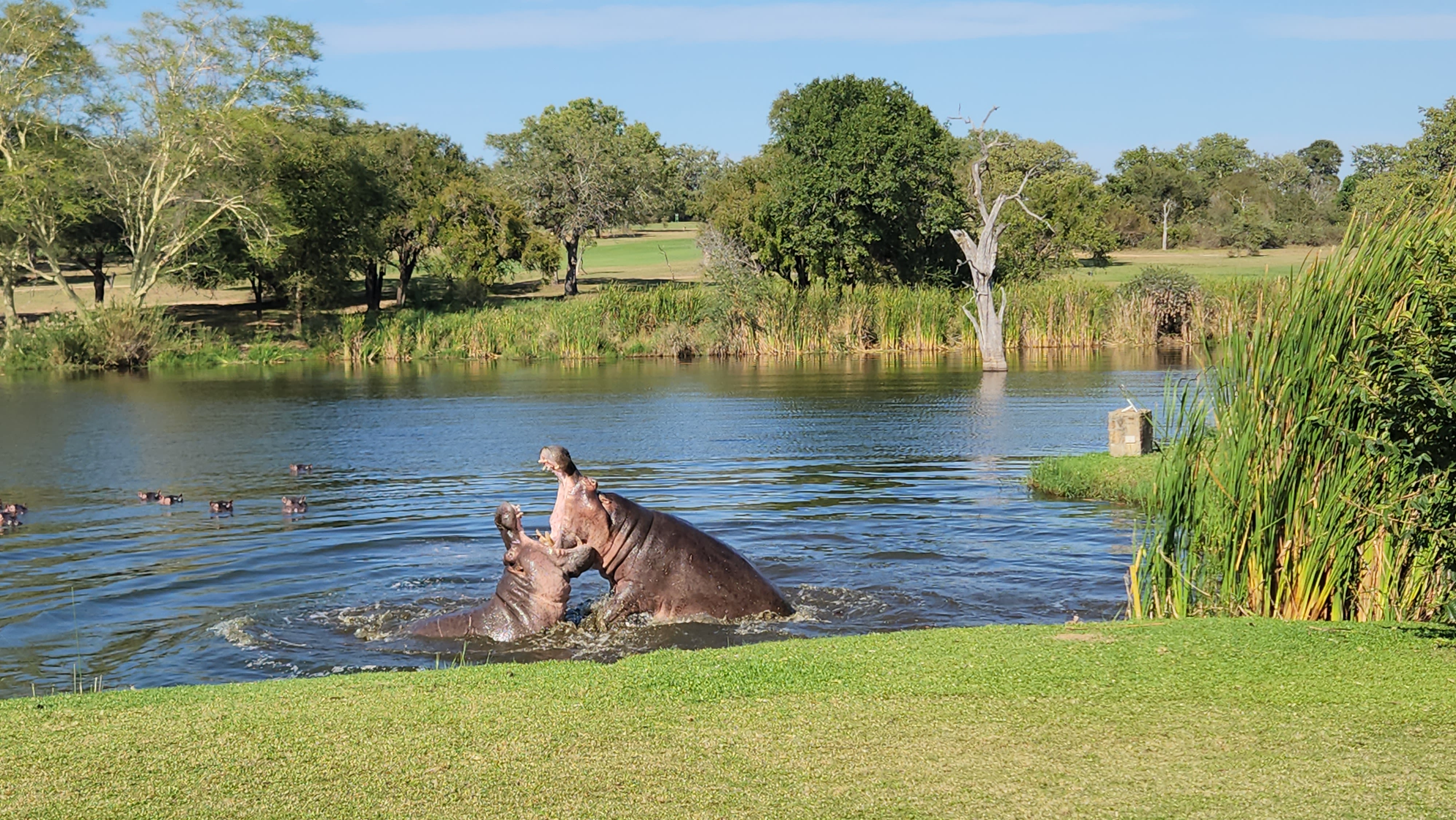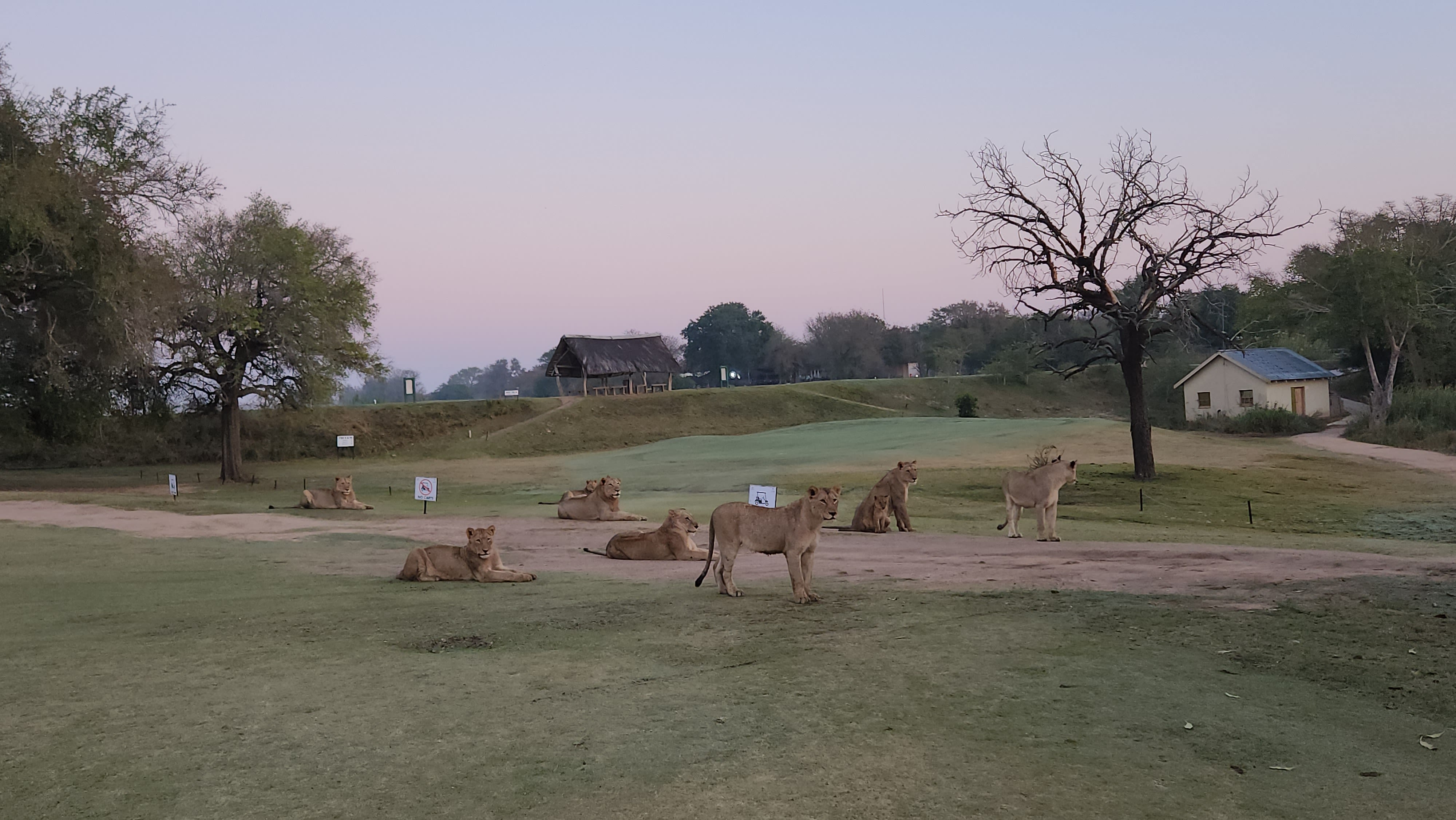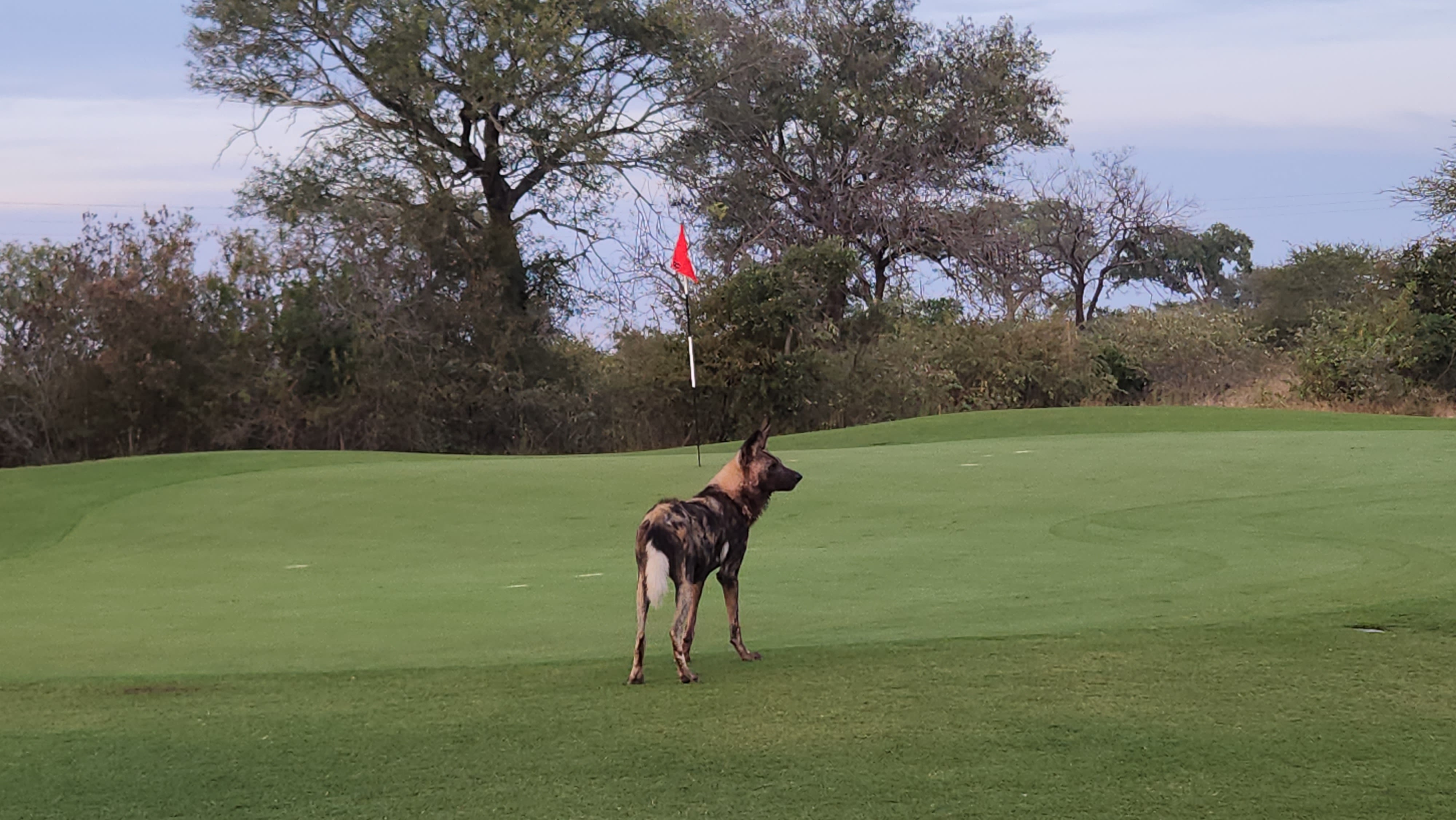Professional golfers have been known to complain about the unruly behavior of crowds, but it could be worse – at one South African course, the spectators once feasted on a giraffe in the middle of the third fairway.
The audience are, quite literally, animals at Skukuza Golf Club in Kruger National Park, which stakes its claim as the “wildest course in the world.”
There’s no shortage of rivals vying for the title. Fairways in southeastern Australia are teeming with kangaroos, alligators glide through water hazards across Florida, while in South Africa’s northernmost province of Limpopo, zebras, wildebeest and antelope graze across Legend Golf and Safari Resort’s Signature Course.
Players at Skukuza can also glimpse all kinds of impressively large herbivores during a round, but there’s one thing they won’t see: fencing.
That means predators, and lots of them. Lions bask lazily around a tee box in the afternoon sun as hyenas loiter nearby to snatch scraps from the pride’s next hunt; a perfectly camouflaged leopard prowls in the thick bush behind a green, while a Nile crocodile – fresh kill between its jaws – eyes golfers from the banks of the aptly named Lake Panic.
Add tree-felling elephants, warring hippos and much more to the mix – it’s all in a day’s work for head greenskeeper Jean Rossouw.
“Our slogan is the wildest course in the world for a reason,” Rossouw told CNN.
“We are in a national park, we want to keep it as natural as possible for the animals to roam free in their environment … that’s the experience you want to give the people. We have everything on this golf course.”

Safety first
Having grown up in the two-million-hectare national park, Rossouw was well suited to a greenkeeping job with responsibilities quite unlike any other when he took on the position in 2016.
Staff and player safety is “first priority,” and precautionary measures begin before first tee off. Rossouw’s team venture out on a daily early morning cart drive around the nine-hole course to check for animal presence, as well as any overnight damage, be it a carcass, broken branches left by elephants, or holes dug by warthogs and other burrowing species.
If the team deems the course unsafe to play, golfers are barred from heading out. Should potentially dangerous animals be spotted on just one section, nearby holes can be closed while the rest remain open. Occupying animals are gently coaxed to move from the area, Rossouw explained, but are left to leave of their own accord if the allure of food doesn’t sway them.
A summary of the club’s safety protocols in action came in August 2022 when the sun rose over a slain giraffe on the third fairway. A feeding frenzy of lions, then hyenas, saw the course promptly closed, with South African National Parks (SANParks), the park’s governing body, called out to remove the carcass via truck. When the predators followed the ranger’s vehicle into the bush, the course was re-opened.
Though staff monitor the course throughout the day and maintain contact with park rangers, all golfers must sign an “activity indemnity form” before playing, adding to the indemnity waiver signed by visitors entering the park via any of its nine main gates.
No major “incidents” have occurred to date, Rossouw said, a run he is confident will endure as long as golfers maintain awareness of the unique environment they are playing in.
“People obviously respect the animals and it goes both ways,” he added. “People tend to think that if there’s a lion on the fairway, it’s going to charge you – it’s not the case. It’s seen and smelled you long before you’ve seen them, so they’ll try and get out of your way first.”

Disruptors
Given the array of bite force on display around the course, Rossouw’s choice for the animal he is most wary of may come as a surprise.
While there’s a shoutout for the hippos that wallow in the waters beside the par-three ninth hole, they typically only venture onto land at night and thus pose a lower threat. Barring winter-time when the hippos wander further in search of grass, or during battles between bulls that move in and out of the water, Rossouw is relatively untroubled.

Instead, buffalo are his one to watch. Weighing anywhere up to 1,800 pounds (816 kilograms), a mean pair of horns twinned with a startling turn of pace make them a formidable presence.
“They’re so unpredictable,” he explained. “They’ve chased me a few times in the golf cart so we definitely keep an eye on them a little bit more.”
Given buffalo are also a chief culprit for course damage, the species is something of a nemesis to the greenkeeping team. A few months ago, one early morning drive revealed a fairway in ruins – trampled and covered in dung by a buffalo herd almost 200-strong.
There was some silver lining to the “nightmare” in the form of free fertilizer, but the incident exemplified how hooved animals like the buffalo and antelope – not the perhaps-expected party of towering elephants – cause the most disruption.
The team gains some respite from the absence of any bunkers, a conscious choice made with the expectation that hippos and crocodiles may nest in the sand, though the sheer abundance of trees – “aerial bunkers” – keeps the workload high.
“With all of that disruptiveness and what the animals consume and eat, never mind cutting it all and making it look in pristine condition, I think the course is doing quite well,” Rossouw said.

A new era
These days, the club is a far cry from the tattered few holes on a disused landing strip that it was when it opened in 1972.
Back then, greens were “browns,” while the clubhouse bar amounted to some drinks in the car boot of one of the member’s cars. Though further holes and a clubhouse eventually followed, it wasn’t until 1999 that the course was opened to the general public, not just club members and park staff.
Practical upgrades have coincided with a front-foot social media strategy to capitalize on the viral appeal of the course’s wildlife. Boasting their own “spectators” tab on the club’s Instagram, the animals – and the chance to play in their proximity – have become an effective marketing tool.
September saw more than 1,000 rounds played at the club for the fifth consecutive month. A nine-hole round for members costs 77 rand ($4), while non-members and overseas visitors, who can rent clubs at the course, can play for 297 rand ($16). Alternative tee boxes that change the length of holes offer golfers the option to play 18 holes.
Membership, now offered worldwide, has also increased, and Rossouw takes great pride in working at an increasingly popular destination. Yet the greenkeeper’s most cherished moments come at the times when there’s not a golfer in sight, when he pours himself a coffee and takes a leisurely early drive around the course.
On a particularly special morning, he may park and quietly observe a pack of his favorite animals: African wild dogs.

Skittish and highly endangered, with just over 1,400 left in the wild according to the World Wildlife Fund (WWF), even a rare sighting makes every buffalo charge or divot more than worthwhile.
“There’s no better place to work,” he said.
“Hopefully it’s part of people’s bucket lists, even if they’re not golfers, just to come and enjoy the facility. Golf or no golf it’s one of the things I’m sure people need to do.”
"course" - Google News
December 15, 2023 at 04:46PM
https://ift.tt/MIK49sd
Lions, leopards and hyenas run wild at this fenceless Kruger National Park golf course - CNN
"course" - Google News
https://ift.tt/Nt9CD8V
https://ift.tt/3hcPGT4
Bagikan Berita Ini














0 Response to "Lions, leopards and hyenas run wild at this fenceless Kruger National Park golf course - CNN"
Post a Comment